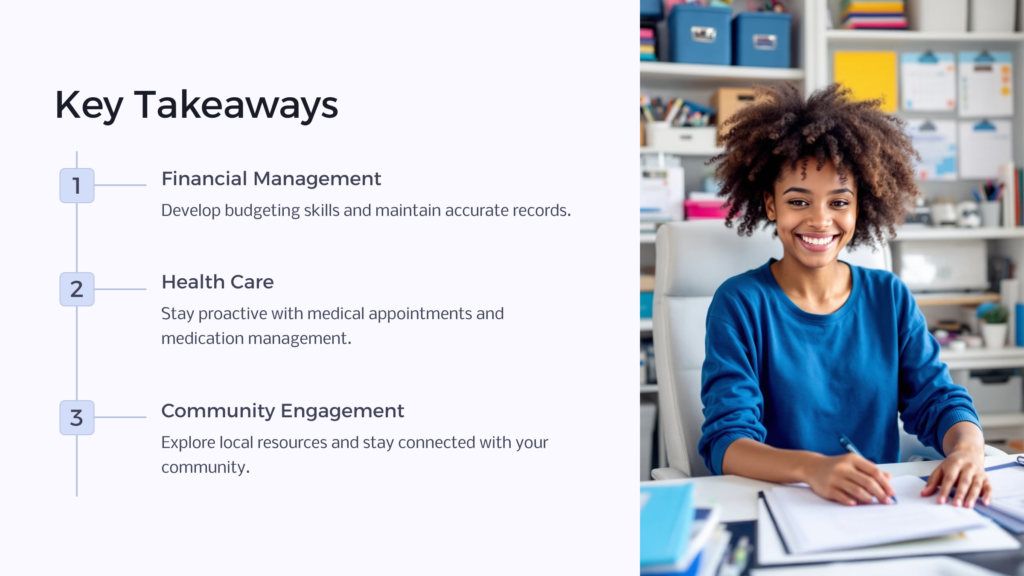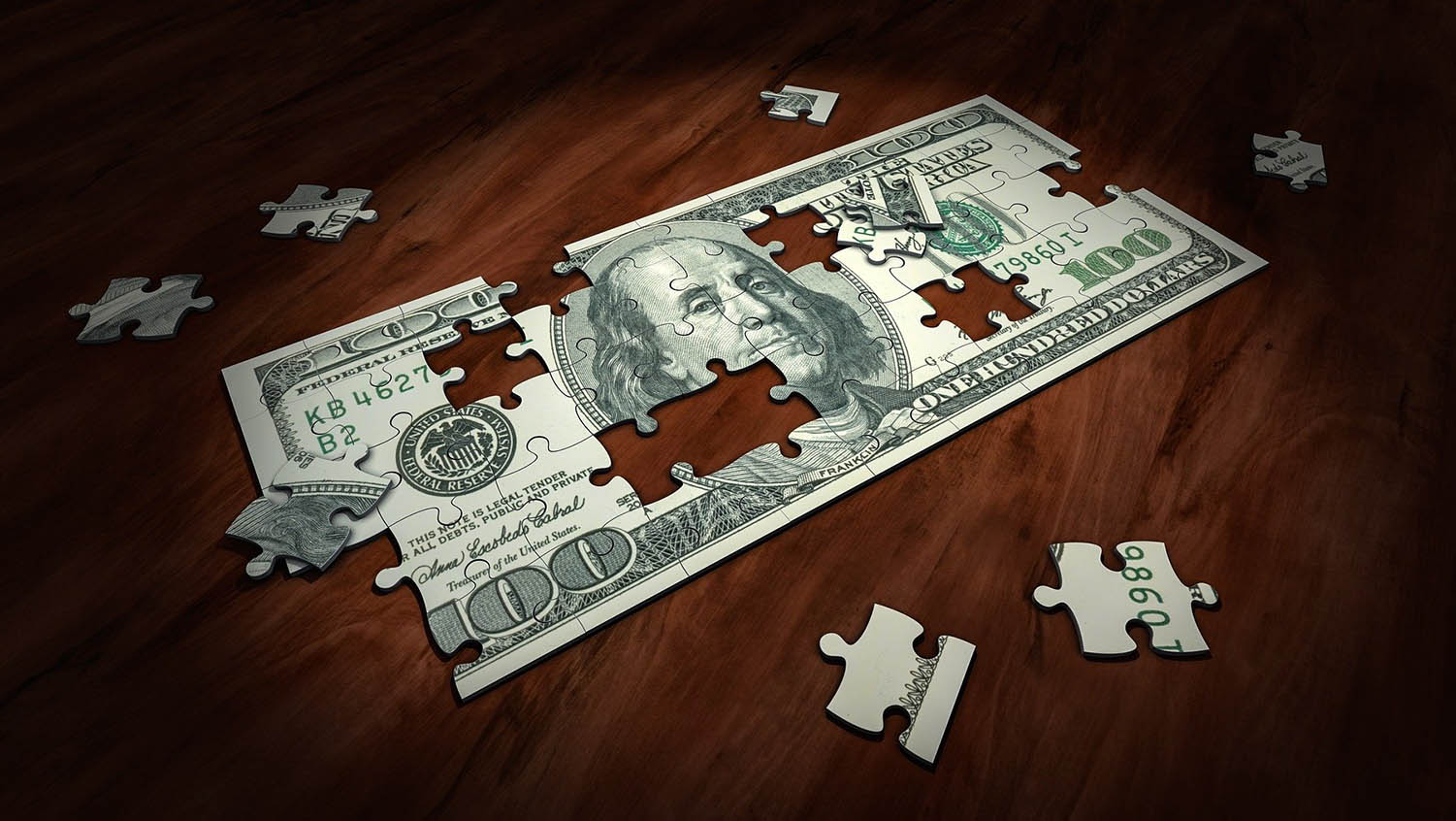It’s a day for celebration when finally you are approved to receive Social Security Disability Insurance benefits—and an even better day once the first check arrives. But soon you realize there are many decisions to make and several skills to acquire to fully maximize your benefits.
While you certainly learned a lot about disability benefits during the application process, there is different set of skills you need to manage your life now and plan for the future. No one expects you to know everything but now is the time to become informed about how best to manage the present and plan for your future.
One of your first decisions is to decide how to manage your finances. If you are capable and feel confident, you can create your own action plan. Or you can ask a trusted relative or friend to work with you. Developing and maintaining a budget and learning basic money management skills are going to be critical for you to successfully manage yourself now and going forward.
The money from SSDI is probably not going to be everything you need for the rest of your life. Understanding how to manage money and plan for the future are responsibilities that everyone is faced with. For you, some of the decisions to make include answering these questions:
Disability Benefits and Important Financial Decisions

What type of bank account are you going to use?
Select a bank convenient to you and set up a meeting with an account advisor to learn about the bank’s various accounts, including regular checking accounts, interest-bearing checking accounts, savings accounts, certificates of deposit, and money market deposit accounts. If you have the ability to access electronic bank account information, you may want to set up an online account as a way of monitoring all banking transactions, including deposits, payments and withdrawal. If you can’t set up an online account then find out how often the bank will send you a statement about the status of your account or how to find out when checks clear or transactions are completed.
How will you access your money to pay for food, housing, and other expenses?
There are many different ways to pay for your budgeted items. Some people prefer to pay by check while others use checks for some bills and cash for other purchases. Cash payments require you to plan in advance to have cash available when you need it OR to have a debit card that allows you to get cash on demand from an ATM (automated teller machine) or at the bank itself at your convenience.
Another consideration is how you pay your bills, either in person, by mail, or by EFT (electronic fund transfer) from your bank account to the vendor. Discuss online accounts, debit cards, and other options with your bank representative. There are also electronic apps that can be used for payment such as Venmo and various electronic wallets (such as eWallet, Apple Pay, or gyft). Review the various bills you have to pay and identify how you plan to pay for them.
What kind of financial record keeping system do you need to put into place?
In addition to keeping a schedule of when bills are due and what payments you have made, setting up a record of expenses and purchases can help you keep track of your money. Some people like to keep a written list that includes each item they spend money on, the date of the payment or purchase, and the amount. This list should also include a column that keeps an up-to-date amount of the money that you still have available. If you set up an online bank account, you can check it daily (or even hourly) to ensure your balance is correct. There are also computer software programs for financial record keeping if you are comfortable using those.
When doing personal banking online, only use a secure Internet connection at home or other trusted location (such as at a relative or friend’s house). Do not use public computers (such as those available at the library) or public Internet sites (such as those available at restaurants or stores) to check your personal bank account or any other financial account, such as credit card accounts. They can be viewed by others on the same unsecured network. The best record keeping system is one that you can easily access and that provides you with correct, current information about your finances.
Manage Your Disability Benefits and Take Control of Your Finances
What money management skills do you need to be able to take care of your current expense, plan for future expenses and maximize your benefit? How will you acquire those skills?
To take control of your finances, the first thing you need to be able to do is create a budget so you know the amount of money coming in and going out. Your math skills should include the four basic functions (addition, subtraction, multiplication, and division) and the ability to double-check your calculations.
In addition, you need to have an accurate understanding of your bills and financial obligations on a weekly, monthly or annual basis. If you have or want credit or debit cards, you must understand the financial and legal obligations tied to each of those.
One of the most important skills you need is to be able to make sound decisions about your bills and expenses so that you can save for an emergency or for something that you can’t afford right now. That includes being able to separate wants from needs in creating a budget and finding ways to minimize your expenses to maximize your money.
Almost everyone can learn new budget skills or tips to improve their money management. You can access information about money management skills online, from your friends and family, or from trusted community sources. It is a process that is ongoing and will allow you the independence and ability to take charge of your life.
Health Management and Your Disability Benefits

Another important set of decisions is centered on how you are going to look after your health. Disability benefits may include medical benefits that help pay for doctor visits, medicine, therapy or treatments, and hospitalization, if necessary.You or someone who helps care for you need to set up a schedule for managing your health issues. Some of the issues related to health management include these questions:
What is your schedule for going to the doctor or any treatment to manage your disability?
 Are you receiving Medicare and/or Medicaid benefits? You can call SSA (1-800-772-1213) to find out if you are not sure. Depending on your medical needs and situation, you may already have a doctor, clinic, or other health organization you visit for your care. If not, you can look for a doctor or clinic by asking family, friends, or searching the internet.
Are you receiving Medicare and/or Medicaid benefits? You can call SSA (1-800-772-1213) to find out if you are not sure. Depending on your medical needs and situation, you may already have a doctor, clinic, or other health organization you visit for your care. If not, you can look for a doctor or clinic by asking family, friends, or searching the internet.
The disability that you have needs to be treated so that you can enjoy quality or life and even improve your current health. When you do visit medical offices, make sure you understand the requirements for payment before you show up for services.
Many doctors ask for payment at time of visit, and will accept credit cards. However, if you know you will not be able to pay your credit card in full, you may not want to add more to your balance and incur interest. Ask the office if you can work out a payment agreement directly with them. They may not charge interest, but if they do, it will be much lower than what a credit card company would charge.
In addition, ask any questions you have about better managing your health and for scheduling follow-up visits to monitor your progress. Don’t be afraid to ask about recommendations for additional services that could help you improve your health, such as nutrition, physical therapy, occupational therapy, or support groups.
Where will you purchase or obtain any medicine you may need?
In some cases, a pharmacy will be at the medical facility where you receive services. Or you may qualify to enroll in a program that helps pay for the drugs or therapy you require. Your doctor or medical facility should be able to help by enrolling you in such programs. If you are going to use a regular pharmacy, find one that is convenient to you and make a point of meeting the pharmacists to explain what you need and learn how they can best serve you. In some cases, there are pharmacies that will take care of contacting your doctor for prescription refills or may offer delivery services right to your door. Keep a list of your medicines, the dosages, and how to obtain refills so that you always have what you need when you need it. This is important information to carry with you in case of emergency or whenever you seek medical care.
In case you become sick, either related or unrelated to your disability, who will you notify and how will you get help?
As part of your health management and planning, you need to develop a plan for understanding your health issues and how to get help when you need it. Having a doctor and maintaining relationships and contact with your health professionals is critical in the event you get sick. You should also have a phone or contact list of neighbors, friends, and relatives who can help you. Of course, true emergencies require a call to 911 for immediate assistance.
Depending on your type and level of disability, and how long you expect to remain disabled, you may want to bring a trusted friend or relative with you to medical visits to be an extra set of ears to help you follow through on the advice you receive, especially if you live alone. You should designate a Health Care Surrogate who can make decisions for you and authorize treatment in case you are unable to speak for yourself.
What will you use for transportation?

Finally, your disability may make it difficult for you to drive yourself or easily take public transportation. Creating a transportation plan for shopping, doctor or therapy visits, social activities, church, or wherever you may need to go requires preparation and budgeting as part of managing your life. Depending on where you live, there may be an array of public services available to you, including transportation, support groups, education, arts and cultural events and classes, sports, and social events. In addition, there may be special community events or organizations that you would like to attend or participate in on a regular basis. Accessing these may help you create the full life you want.
How will you manage your health care benefits?
Once you have a system in place for budgeting and money management along with a plan for maintaining and improving your health, you are on your way to taking advantage of two of the most critical aspects related to your disability benefits. Keep your plans up-to-date and make any revisions along the way to ensure they reflect what is best for you.
Staying on top of your finances and health can be a huge step toward making the most of the life ahead of you now that you have these valuable benefits.

 Benefits.com Advisors
Benefits.com Advisors
With expertise spanning local, state, and federal benefit programs, our team is dedicated to guiding individuals towards the perfect program tailored to their unique circumstances.
Rise to the top with Peak Benefits!
Join our Peak Benefits Newsletter for the latest news, resources, and offers on all things government benefits.




















